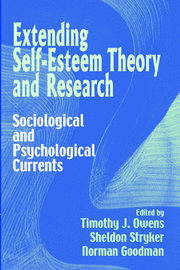Book contents
- Frontmatter
- Contents
- List of Contributors
- SECTION ONE THE FRAME
- 1 The Future of Self-Esteem: An Introduction
- 2 The Self as Social Product and Social Force: Morris Rosenberg and the Elaboration of a Deceptively Simple Effect
- SECTION TWO CONCEPTUAL AND METHODOLOGICAL ISSUES
- SECTION THREE SOCIAL AND LIFE COURSE CONTEXTS OF SELF-ESTEEM
- SECTION FOUR SELF-ESTEEM AND SOCIAL INEQUALITIES
- SECTION FIVE SELF-ESTEEM AND SOCIAL PROBLEMS
- Index
2 - The Self as Social Product and Social Force: Morris Rosenberg and the Elaboration of a Deceptively Simple Effect
Published online by Cambridge University Press: 24 November 2009
- Frontmatter
- Contents
- List of Contributors
- SECTION ONE THE FRAME
- 1 The Future of Self-Esteem: An Introduction
- 2 The Self as Social Product and Social Force: Morris Rosenberg and the Elaboration of a Deceptively Simple Effect
- SECTION TWO CONCEPTUAL AND METHODOLOGICAL ISSUES
- SECTION THREE SOCIAL AND LIFE COURSE CONTEXTS OF SELF-ESTEEM
- SECTION FOUR SELF-ESTEEM AND SOCIAL INEQUALITIES
- SECTION FIVE SELF-ESTEEM AND SOCIAL PROBLEMS
- Index
Summary
INTRODUCTION
Among sociologists and other behavioral and social scientists, Morris Rosenberg is most widely known for his comprehensive and theoretically rich work on the self-concept. Indeed, Rosenberg is arguably the most important self-esteem theorist since William James. Society and the Adolescent Self-Image, the seminal contribution to the field, shared the American Association for the Advancement of Science Sociopsychological Prize in 1963; Black and White Self-Esteem: The Urban School Child (1972) resolved an anomaly that had vexed researchers of self-esteem for years; and Conceiving the Self (1979) earned him the Distinguished Contribution to Scholarship Award from the American Sociological Association in 1981.
Therefore, to understand contemporary work on self-esteem and the self-concept in general, one has to have some understanding of the context from which Rosenberg's theories of the self-concept have arisen; hence, a look at his training and career is highly instructive.
But Morris Rosenberg's bequest to the discipline of sociology is much broader and deeper. In particular, a close reading of his theoretical and empirical studies reveals that his singular contribution to our fuller understanding of society is his ability to construct connections between sometimes apparently unlinked elements of our discipline.
I will focus on three important examples of synthesis. First, within microsociology, his study of the self has combined two distinct paradigms: cognitive social psychology and symbolic interactionism; his ability to see the self as both an entity and a process has enriched our understanding of the social development of the individual.
Information
- Type
- Chapter
- Information
- Extending Self-Esteem Theory and ResearchSociological and Psychological Currents, pp. 10 - 28Publisher: Cambridge University PressPrint publication year: 2001
Accessibility standard: Unknown
Why this information is here
This section outlines the accessibility features of this content - including support for screen readers, full keyboard navigation and high-contrast display options. This may not be relevant for you.Accessibility Information
- 8
- Cited by
